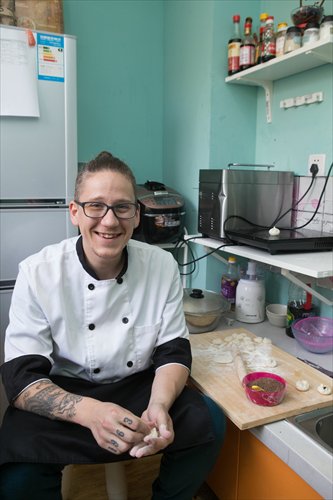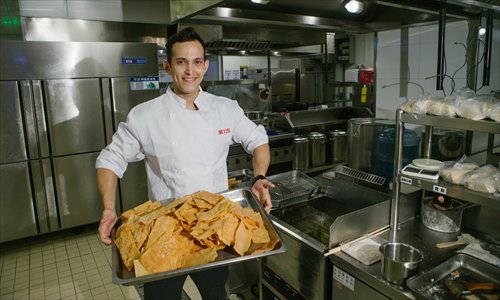Foreign chefs head to the Middle Kingdom to study Chinese cuisine

Mattias Klement, who studied Chinese cooking for three years at Huangshan University in Anhui Province, makes steamed buns at the Beijing international kindergarten where he now works. Photo: Li Hao/GT
Working at his father's restaurant in Romania - a place that served Hungarian comfort food - now-26-year-old Swede Mattias Klement never could have imagined that his next stop would be a fourth-tier city in China. Yet, from 2012 to 2015, that's exactly where he found himself: studying Chinese cuisine in Huangshan, a city in Anhui Province.
"I was over the moon," said Klement, recalling his reaction to the news that he'd received a scholarship to study authentic Chinese cooking at Huangshan University. "It was so much fun, especially stretching the noodles - pa!" He mimicked that sound of the elastic noodle dough snapping against the table. "Twist, then turn. It is amazing."
Klement had to spend a full year studying Chinese before he could launch into his two years of culinary study. Despite the challenges, Klement considers it worthwhile because it will pave the way for him to open an authentic Chinese restaurant back in Sweden.
It's all part of a movement in recent years of foreigners turning away from Westernized Chinese food to authentic regional culinary traditions, especially Sichuan cuisine. While a number of those restaurants are operated by transplanted natives, others are being opened by a growing number of foreigners who are traveling to China to learn its ancient gastronomic arts.



Geoffrey Torres, who studied with a famous Chinese chef for over a year, makes a jianbing in one of his company's kitchens in Beijing. Photos: Li Hao/GT
Learning at Chinese culinary schools
"It was very hard at first. The language barrier, the new style of cooking and there are so many different ingredients I had never seen before. When I came here, I saw all these big woks, high flames and speed, speed, speed. I just thought, 'Oh my god, what have I gotten myself into,'" Klement recalled. "But it was definitely worth it. After three years, I got to know that Chinese gastronomy is so much more complicated than Westerners think. It is not just chao (frying), chao, chao."
He said he lost count of the number of scars he got on his fingers in his endless efforts to chop potato strips as thin as "angel's hair." He still remembered how scared he was the first time he saw the instructor of his Cantonese cooking class butcher a live snake, chopping off its head, skinning it and stewing it (which, he added, turned out delicious).
Though the fast pace of Chinese chefs may look theatrical to outsiders, Klement said it has a real purpose: "In Chinese cooking, timing is everything."
In contrast to some Westerners' perception that Chinese food is all about throwing stuff in a wok and stir-frying it, Klement said it's much more systematic, even scientific. For example, he said, when his teacher cooked soup, he would add the salt at the end, not in the beginning as Klement had previously been taught, to make the soup taste fresher and avoid ruining its flavor.
Katya Knyazeva, a Russian photographer currently based in Shanghai, enrolled in the Sichuan Higher Institute of Cuisine in Chengdu, Sichuan Province in 2012, not for professional reasons, but to learn how to cook her favorite Sichuan dishes at home. "Chinese food is one of the reasons I've stayed in China for 10 years," she said.
She said the training completely upended her preconceptions about Chinese cooking. "You can learn the techniques and basic recipes in class, but the success of the final dish depends on the cook. Recipes don't mention the exact amounts of spices or cooking times [as Western recipes usually do, instead] they say: 'Stir in a little sesame oil, fry a little longer,'" she said. "Each cook relies on their personal taste and experience."
Growing hunger for authentic cuisine
Fuchsia Dunlop, a London-based writer and chef who specializes in Chinese cuisine and was one of the first batch of foreigners to come to China to learn Chinese cooking, recently noticed that there's been a revolutionary change in how Westerners look at Chinese cuisine.
"People in the West are becoming aware that Chinese cuisine is far more than they used to imagine," she said. "We used to just have a very limited view of Chinese cuisine in the West, mainly Cantonese restaurants adapted to foreign tastes. But in the last 10 year or so, there's been huge growth in the diversity of Chinese restaurants in the West. You've got not just Cantonese, but Sichuan, Hunan and Fujian. People are beginning to recognize that China just has so many different flavors, dishes and styles."
Knyazeva said a similar trend is emerging in Russia. In the past, when people there said "Chinese cuisine," they mostly meant northern, Dongbei (Northeast China)-style cooking, which includes a lot of potatoes, stews and breaded deep-fried pork - all familiar terrain for Russians. But more recently, several new Chinese dishes have become hits in restaurants of all styles; for example, last year spicy crushed cucumbers were in vogue in Moscow, Knyazeva said.
Dunlop thinks one reason for the growing popularity of authentic Chinese cuisine is the trendiness of "foodie" culture in the West. "People are interested in food; and China is, for many Westerners, this huge undiscovered country," she said. "People are beginning to see that there is so much more to understand [about Chinese cuisine]."
Another source of this trend are travelers, who want to learn Chinese cooking as a way of understanding the country, and professional Western chefs seeking to take advantage of this new market by training in China.
Though this kind of authentic, regional Chinese cooking hasn't yet reached the mainstream, Dunlop thinks the market is growing and has great potential, in large part because of globalization.
Bringing new flavors overseas
Despite these growing trends, Klement said it still is not easy for foreigners to receive culinary training in China.
"In China, there are not many Chinese schools that enroll foreigners," he said. "At least, if there are, many people do not know about it. It is easy to go to cooking classes, but that's quite different from going to a cooking school."
Yet, compared to past years, Dunlop thinks that things are getting better. In 2009, she was only the first foreigner to attend what was then the Sichuan Higher Institute of Cuisine, but just a few years later there are special programs for foreigners, although all the classes are still conducted only in Chinese.
In the days before foreigners had access to culinary institutions, some of them simply apprenticed with local chefs. Among them is Geoffrey Torres, a 31-year-old American who studied for a little over a year with Sun Lixin, the executive chef of renowned Peking duck restaurant Bianyifang, and is now a partner in Huangtaiji, a fast food chain restaurant well known for its traditional Chinese jianbing.
Torres immediately fell in love with Chinese food when he first came to Beijing 12 years ago. After deciding to dedicate himself to jianbing, a kind of savory Chinese pancake made with egg and fried crackers, he spent months in the kitchen trying to improve on the cooking method.
Torres is now busy preparing to launch his company's first jianbing store in Sydney. After that, he plans to open a Sichuan restaurant in his hometown of Miami to "educate Westerns' minds about real Chinese cuisine."
Klement also plans to open an authentic Sichuan restaurant in Sweden after he gets a bit more experience under his belt. "Now is the time to introduce authentic Chinese food overseas. I think, today, people are less afraid to try real flavors than they were before."
He speculates that the main reason why it's traditionally been so hard to find authentic Chinese food in the West is the difficulty of obtaining ingredients. But he's already found a solution: importing ingredients via Taobao.
"I will continue to stay here to learn about Chinese cuisine," he said. "I want to find a Chinese partner who wants to bring authentic Chinese food abroad to Sweden. I will also travel around China to find new regional foods."
Newspaper headline: Grub of the gods